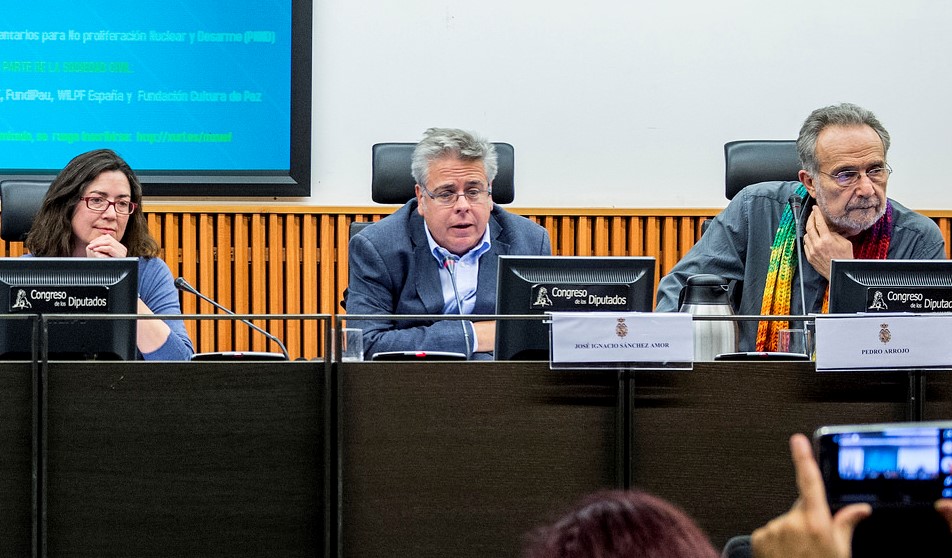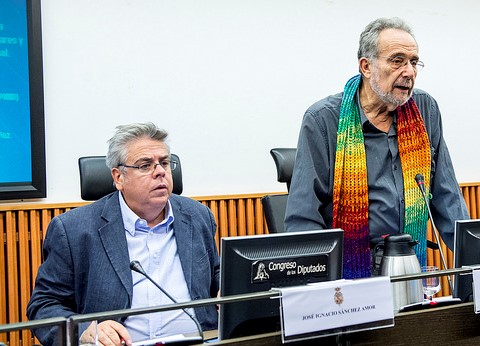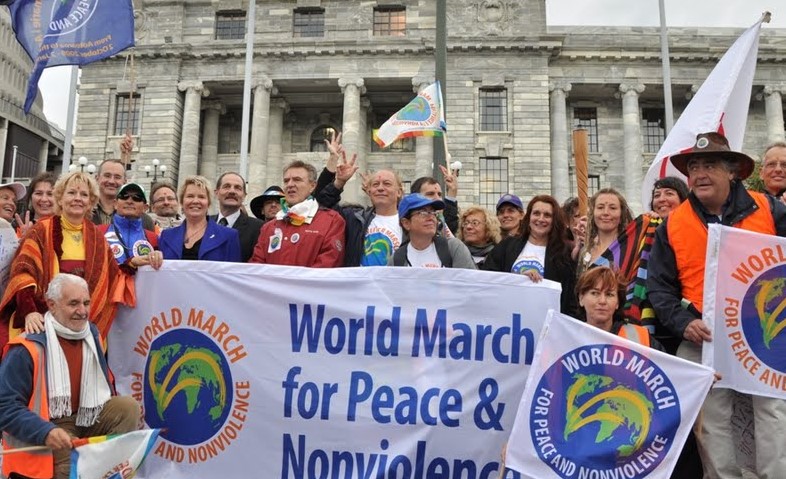Two PNND events held in the Spanish House of Deputies to discuss parliamentary actions to reduce nuclear risks and advance the global prohibition of nuclear weapons.
On November 15, PNND held two events in the Spanish parliament (Congress of Deputies) to discuss risks of nuclear war, international initiatives to abolish nuclear weapons, and a global march for peace planned for the 150th anniversary of the birth of Mahatma Gandhi.
The first meeting was co-hosted by Ignacio Sanchez Amor MP (PSOE, President of the OSCE Parliamentary Assembly Committee on Human Rights, Democracy and Humanitarian Questions), Pedro Arrojo Agudo MP (Chair of the Confederal Group of Unidos Podemos – En Comu Podem – En Marea) and Rafael de la Rubia (Chair of Mundo sin Guerres - World Without War), and co-sponsored by a number of other non-governmental organisations.
Mr Sanchez Amor talked about the importance of PNND in international forums such as the United Nations and the Parliamentary Assembly of the Organisation for Security and Cooperation in Europe (OSCE). He noted that while there may be policy differences between political parties on some aspects of nuclear disarmament, there were many areas for cross-party cooperation, and that PNND provided a forum for this.

Mr Arrojo announced support from the Confederal Group of Unidos Podemos for the Treaty on the Prohibition of Nuclear Weapons, which was adopted at the United Nations on July 7 and which has been signed by 53 countries (all of them non-nuclear States). He discussed the question of whether nuclear weapons might transit Spain, especially by the U.S. air-force, and whether there is a possibility for Spain to prohibit this practice. And he announced that he and another 45 members of the Confederal Group of Unidos Podemos would join PNND.

Mr Ware highlighted the 14-point Parliamentary Action Plan for a nuclear-weapon-free world, and noted that parliamentarians can take action on those points most appropriate for their countries.
He noted that in nuclear-armed States, there is a priority on nuclear-risk reduction to prevent a nuclear war, and on reducing nuclear weapons budgets in order to provide funding required for social, economic and environmental needs.
In allied countries like Spain, there is a priority on phasing out the reliance on extended nuclear deterrence in order to support nuclear disarmament. Ending the policy of first-use of nuclear weapons is vital this regard.
And in non-nuclear countries there is a priority on prohibition of nuclear weapons, through national legislation and/or by joining the Treaty on the Prohibition of Nuclear Weapons.
Mr Ware also spoke about the value of establishing nuclear-weapon-free zones, and the example of the New Zealand 1987 nuclear prohibition legislation which could provide a model for Spain to prohibit transit of nuclear weapons. (See also The ban treaty, transit and national implementation: Drawing on the Aotearoa-New Zealand experience.)
Mr Ware welcomed the new PNND members from Spain, and outlined ways in which they could become active in regional and global initiatives.

Mr de la Rubia announced the plan for a second World March for Peace and Non-violence, which would start in Madrid on October 2, 2019 – the 150th anniversary of the birth of Mahatma Gandhi, and would go around the world returning to Madrid five months later. This will be a decade since the very successful first World March for Peace and Non-violence which was also organised by Mundo sin Guerres and which started in New Zealand. The march aims to highlight successes and further potential of non-violence at all levels of society – from inter-personal relationships to international relations.
Following Mr de la Rubia's announcement, Mr Ware welcomed the plans for the second world march for peace and nonviolence. Mr Ware was the coordinator of the New Zealand section of the World March in 2009.
PNND meeting on cross-party cooperation and action
The second PNND meeting, organised by Ignacio Sanchez Amor MP, was for parliamentarians from different political parties to discuss cooperation for a nuclear-weapon-free world. Mr Ware introduced the 14-point Parliamentary Action Plan (summary in Spanish), along with the nuclear disarmament resolutions adopted by the OSCE Parliamentary Assembly and the Inter-Parliamentary Union Assembly. The Spanish parliament is a member of both bodies.
Mr Ware highlighted the 2018 UN High-Level Conference on Nuclear Disarmament, supported by both the IPU and OSCE Parliamentary Assemblies, as an opportunity for progress. Governments should be encouraged to attend at the highest level.
Mr Sanchez Amor proposed that a PNND Spain section be established with parliamentary representatives from the different political parties.
Shop Sneakers in Footwear

